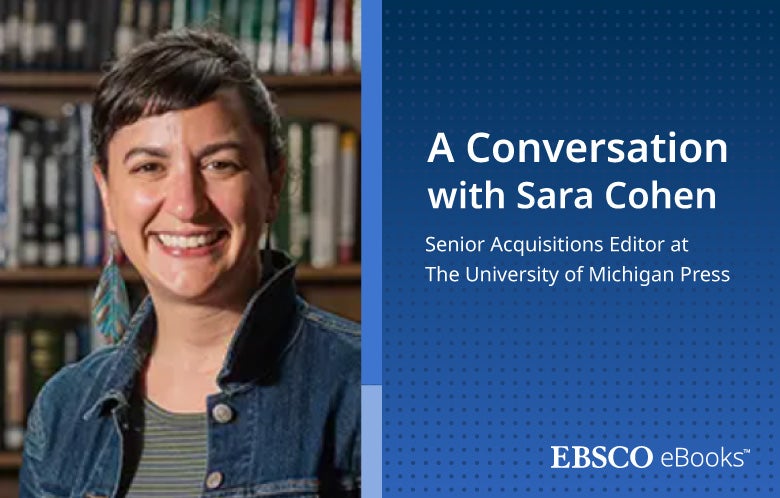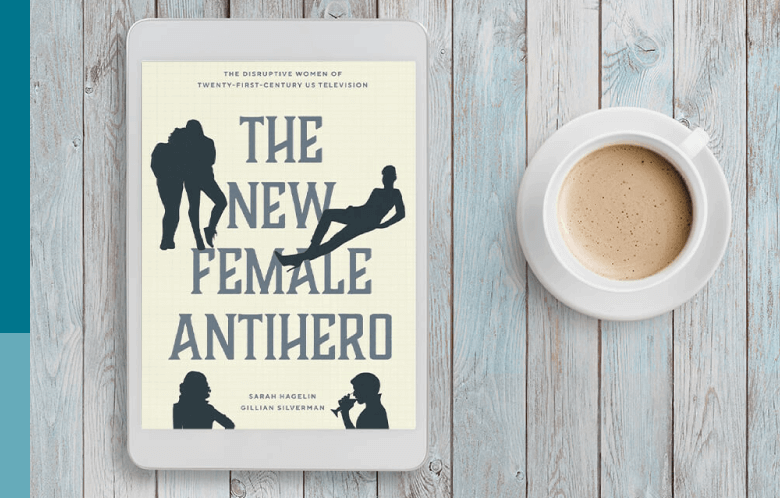The University of Michigan Press is known for their publications in the humanities and social science disciplines, but they offer so much more to academic libraries than top-notch content. They are strongly committed to important initiatives such as equitable access, racial justice, accessibility, and open access. As libraries evaluate publishers it's important to align with organizations that provide the best possible experience to all students and The University of Michigan Press does that and so much more.
To further elaborate on the benefits The University of Michigan Press offers e-book readers we spoke to Director of Sales, Marketing, and Outreach, Kristen Twardowski, and Senior Acquisitions Editor, Sara Cohen, and asked them about new and upcoming publications as well as what steps The University of Michigan Press are taking to create a positive impact in the world of academic publishing. Here is what they had to say:
What is the strategic goal of The University of Michigan Press?
The University of Michigan Press actually falls under the auspices of the University of Michigan Library, so we share the library’s strategic goals. Of course, as the publishing unit, we interpret these goals slightly differently than the rest of the library.
We publish scholarly and educational materials in a range of formats for wide distribution and permanent preservation, and ultimately, we support the broadest possible access to scholarship by promoting:
- the expertise of authors by investing in quality, openness, and innovation;
- equity, justice, and inclusion, our dignity and the dignity of others; and
- improvement in our processes and workflows.
The University of Michigan Press is historically known for publishing high-quality content in the fields of humanities and social science. Can you describe other subjects that University of Michigan Press specializes in and any particular areas of focus?
UMP has strong lists in classics, political science, theater, and performance studies, and in Asian studies.
We have a long history of publishing in disability studies—my colleague LeAnn Fields was one of the first editors to acquire in this area and built an incredible list that I had the privilege to inherit when I joined the Press four years ago. Our commitment to accessibility grows, in part, out of that list and allows us to put our money where our mouth is; we’re not just publishing work about disability, we’re making our work available to readers with disabilities as well.
LeAnn was also an early adopter of LGBTQ studies–her series Triangulations: Lesbian/Gay/Queer Theater/Drama/Performance has been running for over 25 years and includes classics like Marlon Bailey’s Butch Queens Up in Pumps: Gender, Performance, and Ballroom Culture in Detroit, as well as newer books like Translocas: The Politics of Puerto Rican Drag and Trans Performance and Ishtyle: Accenting Gay Indian Nightlife.
In terms of newer list areas, we’re developing a reputation as the go-to press for work on music and social justice due to our series of the same name (Music and Social Justice). I’m particularly proud to have had the opportunity to work with Philip Ewell on his much-anticipated book On Music Theory, which confronts the white supremacist roots of music theory as a field.
I’m also really excited to be working on a new series called Critical Militarization Studies, which will publish books that examine the ways that militarization colors everyday life across the globe. As part of that series, the series editors and I are working together to develop a feminist publishing praxis that will help build a community of authors and support them as they’re working on their book and beyond. We’re particularly interested in supporting and publishing the work of BIPOC and first-generation scholars.
How is the University of Michigan Press supporting Open Access (OA)? Can you describe how OA helps to raise an e-book’s profile, reach the right audience, fulfill the author’s goals, and/or comply with the requirements of a funder or institution?
UMP is supporting OA publishing through a combination of funding from the Provost’s office at the University of Michigan; revenue from the sale of the University of Michigan Press E-book Collection to libraries; and funding from grants and our authors’ universities. When funding comes from grants, universities, or professional organizations, sometimes it comes with a mandate to publish the resulting book open access. However, many of our authors just want to make their books available to the widest audience; for some, publishing their book OA is a social justice issue as it allows them to make their books available to the people and communities they’re writing about in the U.S. and abroad. OA publishing helps authors get their books into as many readers’ hands as possible.
Are there e-books from University of Michigan Press that are being used in academic curriculums?
There are! We keep a running list of our books that have been adopted for classroom use. Identifying e-books used in curriculums is an imperfect science - faculty don’t always let us know when it happens - so we use a combination of our own desk copy request and sales data as well as information from the Open Syllabus Project to track that information. It’s fascinating to see how our books are used. We publish a lot of books that are not textbooks, but many of these more traditional monographs still get classroom use. As we publish more and more open access content, it has become even easier for faculty to use these books in their affordable learning initiatives.
Can you list 5-10 inspirational authors that are helping audiences understand DEI issues in our society?
A.D. Carson: Dr. Carson is Assistant Professor of Hip Hop and the Global South at University of Virginia. His work brings together scholarship and hip hop in the form of what he calls mixtap/e/ssays—we published one of these (I Used to Love to Dream, the first ever peer-reviewed rap album) and are working on a second with him. I love the way his work seamlessly merges Black vernacular culture, creative output, and scholarly production.
Jessi Lee Jackson: Jessi Lee Jackson is a psychotherapist with a PhD in American Studies. As a psychotherapist she’s wor ked with folks in marginalized communities—and she’s also worked with police officers, which was fraught for her because she’s a longtime abolitionist activist. She’s written an amazing book called Uniform Feelings that’s essential reading for anyone who wants to understand the psychology of and the myths surrounding policing in the U.S.
Philip Ewell: I mentioned Dr. Ewell’s work above. He’s made a name for himself in music theory and musicology circles with the bold work he’s been doing to point to the white supremacist roots of music theory as a field. I hope that his book On Music Theory helps to bring about more antiracist work on music theory.
Janice Irvine: Dr. Irvine’s book Marginal People in Deviant Places turns to key mid twentieth-century ethnographies in the sociology of deviance and reads them closely in order to understand what she calls “outsider capitalism,” or how outsiders in U.S. culture became marketable. Dr. Irvine traveled to the sites of all the ethnographies she writes about and collected photos and other archival materials that are included in her book; I worked with her on it during the peak of the pandemic and the book helped me feel like I was traveling across the U.S., meeting new people, while I was on lockdown in my house.
Amanda Apgar: Dr. Apgar’s book The Disabled Child is awesome. Her book critiques memoirs written by the parents of children with disabilities, demonstrating that these memoirs are caught up not only in ableist ideas, but also raced, classed, and heteronormative ideas of what childhood should be. Dr. Apgar a brilliant scholar and a mother who writes this book from a place of rage and love.
What are you doing to meet current accessibility standards?
UMP is proud to be the first university press to be named a Benetech Global Certified Accessible Publisher. In order to maintain our status with Benetech, we require our authors to write alt text for all of their illustrations. (Alt text is short descriptive text that allows readers who use screen readers to hear descriptions of the images.) Because our digital publishing platform allows authors to include film and video in their projects, we also require authors to supply captions for their audio and video files as well as what’s called “visual description” for videos. Visual description provides the text for an audio track that describes what’s happening in a video, so that readers with visual impairments can hear what’s going on.
Why do you feel that EBSCO is a strong partner in helping University of Michigan Press provide e-books to academic libraries worldwide?
Libraries all have unique needs and individual preferences for how they acquire e-books and provide access to their patrons. As a medium-sized press, it’s important to us that we make that access as easy as possible for libraries, many of whom may have small teams who prefer not to juggle the many, many, many platforms that exist. For those libraries, being able to purchase content through EBSCO is an easy solution. Working with EBSCO also allows us to have a much larger international reach than we would otherwise have. We’re lucky enough to have a Library Relations Manager on our staff, but one person, no matter how brilliant, can’t make connections with every library in the world. EBSCO helps us fill that gap.
How can academic libraries add e-books from University of Michigan Press to their existing collection of EBSCO eBooks?
Libraries can add e-books from University of Michigan Press using EBSCOhost Collection Manager (ECM) or GOBI.
Stay informed about new and popular publishers by signing up for the monthly EBSCO eBooks newsletter, ECM Advisor.


